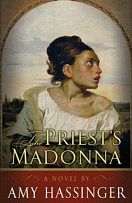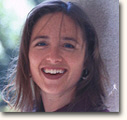In Praise of Lying: Fiction vs. Nonfiction
by Amy Hassinger
Nonfiction is very much in the news these days. Capote, the James Frey debacle and the even creepier Nasdijj scam have raised the kinds of questions that plague many a memoir writer: how much can you really remember? How much can you ethically invent (creating dialogue, for example, from a forgotten conversation), and how much do you have to base on verifiable fact? What is the truth, anyway?

|
Now, I'm not throwing down the gauntlet here. I don't mean to claim that fiction is a superior form. Both fiction and memoir are after the same thing, ultimately, which is to make order and meaning out of the chaos of experience. But as a fiction writer, I can't help but wonder at our culture's current infatuation with the "real." Memoir and creative non-fiction have been fashionable for the past ten or fifteen years. Simultaneously, we've seen the rise of less literary counterparts: reality television, the confessional talk show, round the clock news, and the blog. We're a culture obsessed with literal truth, with the facts. (This new literalism of mind has also reared its head in the world of religion: both fundamentalist and secular thought require a literal approach to myth and metaphor.)
Why? Where does this obsession come from? I suspect it might have something to do with fear. There's so much to fear -- dirty bombs, Avian flu, global warming, sexual predators, identity theft -- yet very little to do. So we prepare by gathering information. Reading about Avian flu can make us feel proactive. It's as if finding out the precise scale of an oncoming tsunami will prevent it from laying waste, as if knowing the statistical chances of a nuclear dirty bomb attack in the Manhattan subway system will keep the terrorist from setting one off. Information is knowledge, after all, and as we all know, knowledge is power.
Power maybe, but wisdom? Do we really understand our lives better the more we know? Do we have a better sense of how to behave in the world, of how to treat our fellow creatures? Do we know where to find peace? Do we have a fuller appreciation of beauty? We might find poetry in scientific discoveries -- in the fact that we can see into the past by looking through the Hubble Space Telescope, for example -- but as a rule, pure information does not supply the sublime experience that art offers. Facts may be useful when you want to graph the distribution of convicted sexual predators in your neighborhood, but they're not a terribly effective way to come to understand one of those predators, to begin to grasp not only the suffering he has caused but also the suffering he endures.
This is where literature comes in. Both memoir and fiction can offer wisdom, moments of beauty, and -- corny as it sounds -- teach us how to be better people. But the memoir writer limits herself to her own experience, to what she knows. Writing what you know -- advice every beginning writer receives -- can be a great way to get started, but ultimately, I find it too limiting. I agree with John Gardner, who said you should write the kind of story you know best, in other words, write what you like to read. If you like to read realistic fiction about small Midwestern towns, and you happen to have grown up in one, then you might be able to do both. But what makes literature so rewarding is that it can take us to places we'd never otherwise go. Writers inhabit the country of the imagination -- the nation of image, as poet William Higginson likes to say -- and one of imagination's greatest virtues is its unfaithfulness. Imagination rambles and roams. It delights in transforming a single daffodil into a rose garden, in making a slightly irritating teacher into a miserable, tortured tyrant.
Exaggeration, embellishment, invention -- these are the things I love about writing fiction. If I want, I can imagine the trials of a tribe of hunted elephants in the African savanna (Barbara Gowdy's The White Bone) or inhabit the body of a hermaphrodite (Jeffrey Eugenides' Middlesex). I can tell all sorts of lies, be as unfaithful as I like to factual truths, as long as I'm faithful to a different sort of truth: the perennial emotional truths that permeate human experience, truths that bring us closer not necessarily to power, but to wisdom. These are the reasons I write fiction.
These, and the fact that I have a crappy memory.
 Amy Hassinger is a graduate of Barnard College and the Iowa Writers'
Workshop. She is the author of
The Priest's Madonna (April, 2006) and
Nina: Adolescence. She teaches in
the University of Nebraska's MFA Program in Creative Writing and lives in
Illinois with her husband and daughter.
Amy Hassinger is a graduate of Barnard College and the Iowa Writers'
Workshop. She is the author of
The Priest's Madonna (April, 2006) and
Nina: Adolescence. She teaches in
the University of Nebraska's MFA Program in Creative Writing and lives in
Illinois with her husband and daughter.
Return to the June 2006 issue of The IWJ.
More from Writers Write
